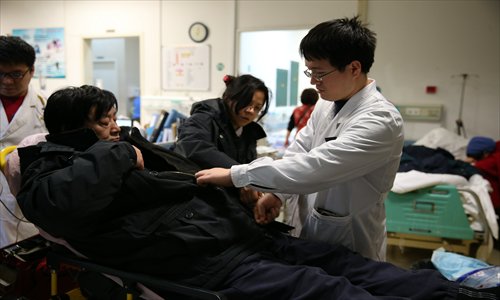Grim career prognosis

Becoming a doctor is regarded a respected career path worldwide, although in China it's a job description that can entail long hours, low pay and the risk of violence. The public backlash against doctors has turned many away from the profession, however medical schools nationwide still brim with those hoping to make a difference to the country's strained health care sector.
Zhao Wenjie, 20, aspires to study medicine at Tongji University in his native Shanghai. He's aware of the long road ahead he faces, which includes eight years of combined study and interning.
"Being a doctor is my dream because I am interested in biology. My parents support me 100 percent," he said.
Wang Yi'nan is another aspiring doctor, studying traditional Chinese medicine (TCM) at Capital Medical University in Beijing. A spate of attacks targeting doctors, some of them fatal, since 2011 across the country has made him anxious, although he insists such cases are isolated.
"Patients who attack doctors are in the minority. I will try my best to explain everything clearly to my patients to avoid unnecessary trouble," he said.
Patients losing patience
But it is this "minority" that has put doctors in China on edge, prompting security to be stepped up to ensure safety.
In September 2011, a 45-year-old patient wielding a knife stabbed a doctor 17 times at Tongren Hospital in Dongcheng district, severely injuring his arms, neck, head and back. The patient was angry about his throat cancer had returned after an operation.
In March 2012, a 17-year-old patient stormed the rheumatology department at a hospital affiliated with Harbin Medical University in Heilongjiang Province, stabbing four medical staffers including a 28-year-old intern surnamed Wang, who later died of his injuries. The teenager, diagnosed with a spinal disease, was frustrated at being turned down by doctors five times and traveling 10 hours by train to visit the hospital.
Just one month after that attack, a 54-year-old cancer patient at the No.3 People's Hospital in Hengyang, Hunan Province, stabbed his doctor surnamed Chen 28 times, killing her within minutes.
Official data is unavailable on attacks on doctors in China, however the AP reported there were more than 17,000 "violent incidents" at health care facilities nationwide in 2010, a 70 percent increase from 2004.
Plummeting trust in doctors
A report submitted by Yu Jinming, a National People's Congress deputy and director of the Shandong Tumor Prevention and Treatment Institution, during the recently concluded two sessions also shed light on China's medical discord. It found only 10 percent of patients trust their doctors.
Arguably, a contributing factor to doctor-patient disharmony can be found in the sheer workload facing medical professionals. China's patient-doctor ratio is 950:1, more than double the US at 390:1, according to 2001 statistics from the World Health Report.
"It is common for doctors to see more patients than are booked for them because patients are many, doctors are few and time is limited. Doctors cannot always explain everything in detail, which can lead to misunderstandings with patients," Shu Chang, a dermatologist at Peking Union Medical College Hospital (PUMCH), told Metro Beijing.
Shu noted improving tense doctor-patient relations in China depends on addressing three key areas.
Firstly, government investment in health care should be increased to improve doctor training and subsidize patients' medical costs, he said.
In 2012, 5.1 percent of GDP was spent on health care, according to the Ministry of Health. By comparison, the US' total health expenditure of its GDP was 17.6 percent in 2010.
Secondly, patient expectations need to be adjusted so that those with serious diseases can come to terms with grim diagnoses, Shu said.
Finally, Shu attributed public distrust of doctors to irresponsible reporting by the media, saying misleading reports that cast hospital staff in a negative light "fan the flames and escalate tension."
Becoming a doctor in China requires at least five years of undergraduate study at medical school, although drop-out rates rank among the country's highest in tertiary education.
The 2012 Chinese College Graduates' Employment Annual Report by the MyCos Research Institute found medical graduates in China earn an average monthly salary of 2,339 yuan ($377) within six months of graduation.
The harsh reality of this overworked, underpaid profession means each year only 100,000 out of China's 600,000 medical school graduates, or less than 17 percent, actually become doctors, China National Radio reported.
In contrast to stereotypes of Chinese parents pushing their children to become doctors, the Chinese Medical Doctor Association found in 2011 that a staggering 88 percent of parents opposed their children becoming doctors.
Hospital administration woes
Lu Jie used to work as a doctor at PUMCH, before quitting in September 2011 to launch his own smartphone application business. Working 10 hours a day during a grueling three-and-a-half-year internship that spared him no holidays, Lu turned his back on his medical dream.
"I would be woken all the time from being on call, sometimes several minutes after I would lie down," Lu recalled, adding he also grew disillusioned by the bleak prospect of promotion.
"Doctors need to publish papers to get promoted, but this only reflects their essay-writing ability and not their medical proficiency."
In late 2011, Lu launched the "Spring Rain Doctor" app that allows users to ask questions to some 5,000 medical professionals.
Liu Ye, a lawyer at the Shanghai-based Haishang Law Firm who specializes in medical law, said that the country's legislation hardly promotes doctor-patient harmony.
In an April 2012 blog post Liu wrote titled "Why the law cannot tackle tense doctor-patient relations," he claimed patients often feel motivated to take matters into their own hands.
"Rulings in medical malpractice cases are a main trigger of violence against doctors," Liu wrote, referring to low compensation.
Wang Liao, a 20-year-old student at Peking University Health Science Center, said that the public backlash against doctors only inspires him to help change the system.
"I want to work on my communication skills and try to put myself in patients' shoes," Wang said.